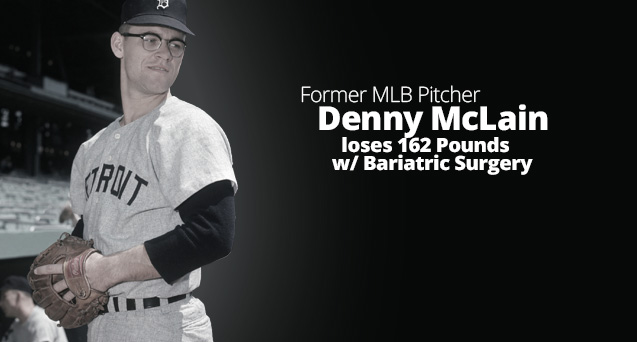By Aloha Surgery (t)
28 Apr, 2014
Aloha Surgery News, Bariatric Surgery, Health Tips, News, Vertical Sleeve Gastrectomy, Weight Loss
Aloha Surgery, cnn health, denny mclain, Dr. Steven Fowler, major league baseball, mlb pitcher gets bariatric surgery, sleeve gastrectomy
According to a recent article by CNN Health, Former MLB Pitcher Drops 162 Pounds, Denny McLain received a sleeve gastrectomy last June and lost 162 pounds.
In 1968, McLain became the last pitcher to win 31 games in a season, a record that has not been broken since. His awards include the Cy Young winner, the Most Valuable Player Award, and cover of Time Magazine that season.
More
After
bariatric surgery follow up care is essential to long term success and health.
Dr. Fowler would like to see all his patients routinely:
- 1 week
- 1 month
- 3 months
- 6 months
- 1 year
- annually for the rest of your life.
Yes, weight loss is the goal, but overall health is most important and can to be evaluated in follow up visits. At these regular check ups, Dr. Fowler will be making sure patients do not have any vitamin deficiencies.
More
So what is a Hiatal Hernia and why should I care about it?
Hiatal Hernia is a condition where the opening from your chest to your abdominal cavity is abnormally large. The esophagus passes through this opening, or ‘hiatus”, so the most common problem associated with this condition is where part of the stomach gets pushed up into the chest. Hiatal Hernias are often small and asymptomatic. Less than 10% of the population has one, and usually the only thing they notice is acid reflux symptoms. So if you have strong heart burn and have to watch what you eat, there is a possibility that you have this condition.
It is very important for your weight loss surgeon to fix this defect if it is found during the operation. Recent data suggests that an unrepaired Hiatal Hernia during placement of an adjustable Gastric Band is associated with early Band failure… i.e. slippage, pouch dilation, band intollernce, etc. For Bypass and Sleeve patients, the Hiatal Hernia should be fixed to ensure that the gastric pouch size or sleeve creation are the correct size. Repairing a Hiatal Hernia almost always can be done laparoscopically through the same incisions I create, and usually adds just a little extra time to the original procedure.
More
Strictures are a problem unique to the Bypass and Sleeve patients. Basically, it is a narrowing preventing food to pass normally through your digestive system. With the Bypass, strictures occur at the gastro-jejunal anastomosis (the top connection where the small bowel is attached to the gastric pouch). Sleeve patients can have a stricture anywhere along the length of the stapled stomach. A stricture will almost always occur within the first three months after surgery. Generally, a patient will complain of not being able to advance their diet beyond liquids. They may have frequent vomiting episodes, or even night time regurgitation/reflux.
A stricture can be identified by an Upper GI Swallow, but the most appropriate test is an EGD (v). An EGD is where the doctor gives you an IV sedation, and they pass a long flexible scope with a camera on the end, down the esophagus to evaluate the narrowing. If there is indeed a stricture, the doctor can usually dilate it with a balloon. Strictures commonly are fixed withEGD dilations, but sometimes a surgery is required for persistent symptoms. One of the new options for treatment include placement of a temporary stent via the endoscope.
What causes a stricture? We can’t always say with certainty why one individual ends up with a stricture. But factors that can create this problem include how the surgery was done and how the patient responds to healing/scarring. Strictures are rare, anywhere from 1 to 8% in the literature. A reasonable stricture rate for a surgeon should be 1-3%.
More


